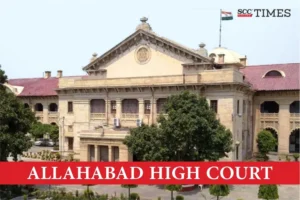Allahabad High Court: In a writ petition filed to quash the First Information Report (‘FIR’) registered for offences under Sections 363, 366 of the Penal Code, 1860 (‘IPC’) and for a direction to the Police to not arrest the petitioners in pursuance of the FIR, the division bench of Vivek Kumar Birla, and Arun Kumar Singh Deshwal, JJ. viewed that from the FIR, no offence under Section 366 IPC is made out, in as much as, both the petitioners are major and petitioner 1 had left her home with petitioner 2 willingly and is living with him as a married woman.
Further, while criticizing the practice of annexing the statement of the victim recorded under Section 1641 Code of Criminal Procedure, 1973 (‘CrPC’) by the accused, asked the Magistrates / Courts to not issue certified copies of the statement recorded under Section 164 CrPC to any person till cognizance is taken on the charge sheet / police report.
The Court noted that petitioner 1 in her statements recorded under Section 164 CrPC has not supported the prosecution version and has categorically stated that she left her home willingly with petitioner 2, and they have married each other, and there was consented physical relationship.
The Court viewed that from the FIR, no offence under Section 366 IPC is made out, in as much as, both the petitioners are major and petitioner 1 had left her home with petitioner 2 willingly and is living with him as a married woman.
Thus, the Court quashed the impugned FIR, as well as all consequential proceedings.
However, the Court clarified that while deciding the present petition, it has not looked into the validity of marriage of the petitioners.
The Court noted that in several cases, the statements recorded under Section 164 CrPC are being filed by the accused before this Court while challenging FIR under Article 226 of the Constitution of India, and said that this practice has been strictly deprecated by the Supreme Court in State of Karnataka v. Shivanna, (2014) 8 SCC 913 and in A. v. State of U.P. (2020) 10 SCC 505.
The Court said that in the above-mentioned cases, it was clearly observed that accused or any other person has no right to receive copy of statements recorded under Section 164 CrPC until cognizance is taken by the Court concerned / Magistrate on chargesheet / police report filed u/s. 173 CrPC. Further, immediately after recording statement under Section 164 CrPC, copy of the same be given to Investigating Officer with specific direction that contents of such statement should not be disclosed to any person till chargesheet / police report is filed.
Therefore, the Court criticized this practice of annexing the statement of the victim recorded under Section 164 CrPC by the accused. Further, the Court asked the Magistrates / Courts to not issue certified copies of the statement recorded under Section 164 CrPC to any person till cognizance is taken on the charge sheet / police report.
The Court also noted that even lower Courts are issuing certified copies of the statements recorded under Section 164 CrPC which is legally not permissible.
Thus, the Court directed the Registrar General of this Court to bring this order in the knowledge of the Chief Justice so that if it is found appropriate, a circular may be issued to the District Courts of the State of U.P.
Further, the Court directed the Investigating Officers not to supply a copy of the statements recorded under Section 164 CrPC to any person during the investigation.
[Ujala v. State of UP, 2024 SCC OnLine All 4485, decided on 23-08-2024]
Advocates who appeared in this case :
Counsel for Petitioner: Arvind Kumar, Vidya Sagar Rajbhar
Counsel for Respondent: Government Advocate
Buy Code of Criminal Procedure, 1973 HERE
Buy Constitution of India HERE
Buy Penal Code, 1860 HERE
1. Section 183 of BNSS, 2023

